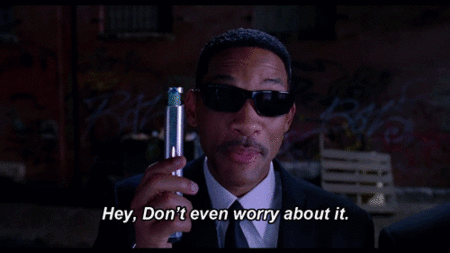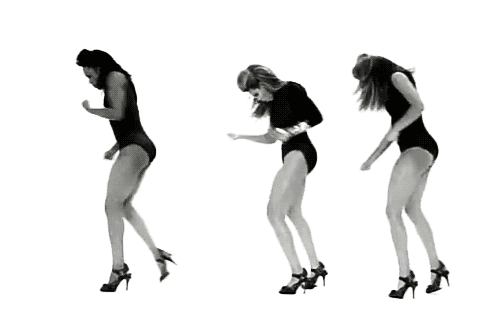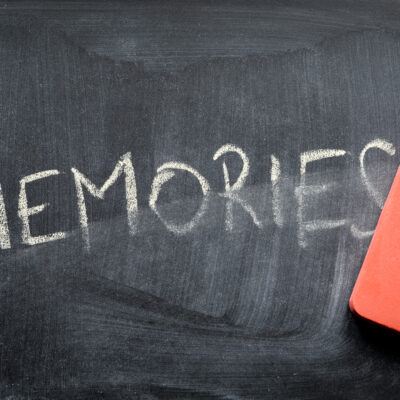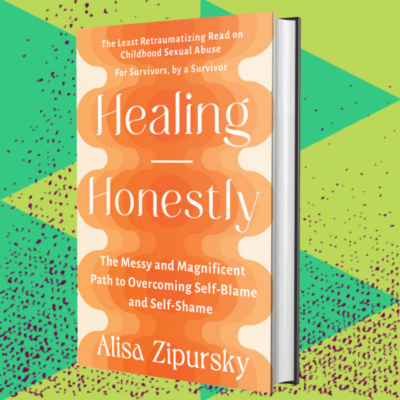This story may contain descriptions of PTSD symptoms, discussion of child sexual abuse, and the effects of trauma.
Last spring I wrote about what it’s like to not be able to remember my sexual trauma and a funny thing happened. It was the hardest piece I had written up until that point. It made me feel vulnerable to publicly say that I have no memory of my sexual abuse and yet am confident I am a survivor. And here’s the bananas part: since November 1, that story I published in May has seen a 417% increase in traffic. It is clear that since November with #metoo and other conversations about sexual abuse there have been so many more people searching for information about memory loss and sexual trauma.
The topic I was most afraid to write about, my fears and questions about not remembering my trauma, is apparently what I most needed to write. To say that I no longer feel alone is such an understatement.

So I began doing some research for me and for all of us to have more of an understanding of why we can’t remember what we can’t remember. What I’ve found has made me feel so seen, and so very normal because memory loss and suppression is one of several totally normal brain responses to unbearable trauma.
I finally read the book that I feel like all of you already beat me to (thanks so many of you the recommendation!) Dr. Bessel Van Der Kolk’s The Body Keeps the Score: Brain, Mind and Body in the Healing of Trauma. Someone once described it to me as a guidebook for a person with trauma, and that’s totally what it’s been for me. Dr. Van Der Kolk is the foremost trauma expert in the US and is the founder and medical director of the Trauma Center in Brookline, Massachusetts. (This post is not sponsored by him, trust, it’s just that dude knows his stuff and is great at explaining it).
An important note: everything I’m going to explain below I’ve written in the context of sexual trauma, but the science is true for all trauma, whether it’s surviving violence, abuse or a terrible car crash.
1. Memory loss of sexual trauma is way more common than we think
Memory loss is very common. Kolk sites total memory loss as most common in childhood sexual abuse (opposed to other traumatic experiences), with incidence ranging from 19-38% percent. I was floored when I read that statistic. We are not an anomaly nor statistical outlier.

It may feel like memory loss with trauma isn’t common because in our culture, and even in our healthcare system, there can be such little discussion or understanding of memory loss and trauma. But Kolk says there have, in fact, been hundreds of scientific publications spanning well over a century documenting how the memory of trauma can be repressed, only to resurface years or decades later. He notes that this issue isn’t controversial, and the Diagnostic and Statistical Manual of Mental Disorders (DSM) recognized memory loss for traumatic events as early as the 1980s.
2. Memory loss is a completely normal response to trauma
First things first, our brains shattering the memories of our abuse is a totally normal brain response to unimaginable trauma. It is not an indication that anything about us is broken, but rather, it is a very healthy defense mechanism that our brains use to protect us so that we can continue to survive trauma. But the opposite is also true: remembering our trauma is a normal brain response too. All this is to say simply the amount of memory you have is no reflection on the validity of your trauma.

When we talk about memory loss, we are talking about losing clarity, from minutes to years of time where our brains cannot clearly tell the story of what happened during that period. The memory can be lost forever, or re-emerge, but often when it does re-emerge it can lack a clear beginning, middle and end of a story.
3. What’s going on in the brain when we lose traumatic memory
I’m working on another post that explains what happens to our brain when we experience trauma, because real talk, it’s bananas. There are brain scans that show the physiology of our brains actually change with trauma, so we’ll get more into those details in the future, but for now I wanted to explain what we know about neuroscience, memory and trauma. Below is Kolk explaining it, and I follow his explanation with my more simplified, digestible version of his words.
As Kolk explains:
“When memory traces of the original sounds, images, and sensations are reactivated, the frontal lobe shuts down, including, as we’ve seen, the region necessary to put feelings into words, the region that creates our sense of location in time, and the thalamus, which integrates the raw data of incoming sensations. At this point the emotional brain, which is not under conscious control and cannot communicate in words, takes over. The emotional brain (the limbic area and the brain stem) expresses its altered activation through changes in the emotional arousal, body physiology, and muscular action. Under ordinary conditions these two memory systems–rational and emotional–collaborate to produce an integrated response. But high arousal not only changes the balance between them but also disconnects other brain areas necessary for the proper storage and integration of incoming information, such as the hippocampus and the thalamus. As a result, the imprints of traumatic experiences are organized not as coherent logical narratives but in fragmented sensory and emotional traces: images, sounds, and physical sensations.”
Okay, IN ENGLISH, here’s how it goes: When we are traumatized, the part of our brain that puts feelings into words and gives us a sense of place and time shuts down (the frontal lobe and thalamus) . The limbic area and brain stem takes over (This can also be called the “emotional brain” and is also where the amygdala, which is responsible for fight/flight responses lives). Without the balance between these two parts of our brain, our brains cannot properly store new memories.
As you can see from this MRI scan of a brain experiencing a flashback of trauma, the right side, or “emotional” side where the limbic area brain stem are, is all lit up working, and the left “rational” side of the brain where the frontal lobe is is way less active. These two sides have to be in balance in order to store memory properly.

4. The body remembers traumatic experiences
We already talked about how our brains go out of balance when experiencing trauma which can make it very difficult to store memory. Personally, I have no clear memory of the abuse, but my body remembers the trauma very clearly. When I think of my abuser, my stomach curls, and my whole body turns into itself like I want to scrunch up into a ball and I feel exposed and skeeved out.
And now I finally know why it’s that my body remembers my trauma, and while all my brain can see is flashes of places, still images of my abuser, and images of locations I never remember going to. As you can see from the scan above, there are these two gaping white holes at the bottom of the scan, labeled “Lateral Nucleus of Thalamus”. You’ll see that the thalamus nearly or totally turned off while experiencing trauma or retraumatization.

“Breakdown of the thalamus explains why trauma is primarily remembered not as a story, a narrative with a beginning, middle and end, but as isolated sensory imprints: images, sounds, and physical sensations that are accompanied by intense emotions, usually terror and helplessness.” says Kolk.
Something that helped me understand is to compare the way our brains store happy memories versus traumatic memories. I’m going to think about a happy memory, I am thinking about my Mom’s birthday last year, and my sister flying in for the occasion and us getting sister tattoos, and heading straight from the tattoo parlour to a dinner celebrating our favorite lady with amazing food, wine and company. I remember my sister and I getting ready in the morning for the party, being at the tattoo parlour, walking in the door to show off our new ink, and making toasts around the dinner table. I remember everything in order, but don’t remember what it smelled like, or sounded like. When I think of getting the tattoo, I don’t feel any pain in my arm where it is, I remember the experience from my brain, not my body.

Kolk explains there are two major differences between positive and traumatic memories:
- How the memories are organized
- Our physical reactions to them
In the case of the memory of my mom’s birthday, I remember the evening in sequential order without any major periods of time missing, it is an organized memory with a beginning, middle and end, and I have no physical reaction to the memory.
Whereas memory of my trauma is completely disorganized. There are huge gaps of my childhood missing from my memory, and the little I see, images and sounds, have no story that goes along with them. I see it all without any real context to make sense of it. I also have enormous physical reactions to the flashbacks or memories that I do have, including nausea, hunching my body, and a general full-body ickiness (technical term).
It is important to note that there is another way that the way the body remembers trauma, which is depersonalization, and it can look like from the outside is that the survivor is frozen or completely shut down. In this instance, the person who is traumatized dissociated their fears and feels nothing, or is numb, which in and of itself can be crippling. This also is a completely normal response to trauma.
You see in the above photo, this is a brain scan of a woman experiencing a flashback of a traumatic car crash. Her initial response to the crash had been to freeze and her brain, as you can see, shut down. When she has her flashbacks, the same thing happens in her brain, even years later. This is completely normal.

5. Remembering is not necessary for healing
Here’s another thing that rocked my world: in Kolk’s 1995 study of trauma and memory published in the Journal of Traumatic Stress they found that, to their surprise, remembering the trauma with all its associated effects does not necessarily resolve it. Most of the study participants could tell a coherent story about their trauma, but it didn’t stop them from being haunted by painful images and physical sensations.
I’ve visited some therapists that harp so much on my childhood, trying to get me to put things in chronological order or reveal repressed memory to myself. And frankly, it really irritated me, as my gut told me that I would never really remember clearly, and it made me feel like if I didn’t recall these wildly painful repressive memories then maybe I’d never heal, or maybe I wasn’t a “real survivor”.

Now I know that to absolutely not be the truth. We’ve already talked about how common memory loss is, and so not having memory absolutely does not invalidate my survivorship. But also, there isn’t scientific proof that trying to recover memory actually helps us heal.
What I have found to be important in my healing is to be able to tell the story, in my own words, of what happened to me (for example: I was sexually abused by my father and have no memory of the trauma). Finding the words to explain what happened to us can be transformative, and can help us gain a sense of control and agency.
But that’s very different than memory recovery. I still struggle to accept that I may never clearly remember what happened to me, or know the specifics about abuse I endured. But understanding that memory recovery is not required for healing has brought me a lot closer to accepting my truth, that I’m an incest survivor with no clear memory of the abuse.
6. Yes, you can be a “real” survivor and have no memory of the trauma
There are so many messages we’ve received, from the culture, from our lived experiences, and from around us to the people in our lives, that tell us that that we will not believed about our abuse. That there are “real survivors”, and maybe we aren’t one of them. For those of us who’ve experienced memory loss, we can be silenced and invalidated by the fact that we don’t have clear memory.
Remembering is hard.
Not remembering is hard.

I hope that if you have those moments when the world makes you feel invalidated because of your lack of clear memory, you can remember this post and me and remember that you are not alone. Your brain is responding in a completely normal way to unbearable pain. As always, I’m here. Email me at Alisa [at] healing honestly [dot] com.
*shoutout to my girl Nelly, finishing her PhD in neuroscience (brushes shoulders off), who edited this piece to make sure I didn’t put any fake science out into the internet. Love you and am grateful for and immensely of your genius.
Want me to come speak at your event or facilitate a workshop?
I travel around the country giving talks, facilitate workshops and engaging on panels on the topics of healing from sexual trauma and supporting survivors. I promise, it’s more fun than you’d think. I’d love to speak at your event! Just shoot me an email through my contact page and we can talk about working together.

